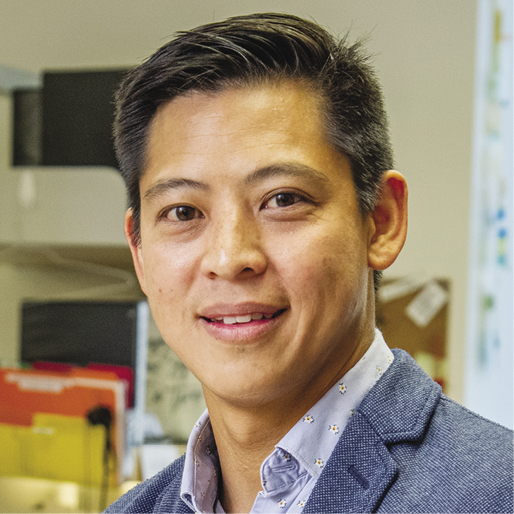Eric Wang, Ph.D.
Associate Professor of Molecular Genetics and Microbiology
College of Medicine
2023 Awardee
Eric Wang specializes in the study of RNA biology and mechanisms that underlie repeat expansion diseases, in particular myotonic dystrophy. His research is aimed at discovering and applying basic biological insights to develop better treatments for myotonic dystrophy and other genetically inherited neurological disorders.
More than 60 diseases, including the most common genetic cause of ALS, Huntington’s disease and Fragile X syndrome, are caused by repetitive DNA sequences that can produce toxic RNAs and toxic proteins. Wang’s drive to study these diseases originated in childhood, when his father was diagnosed with myotonic dystrophy, and he later learned that multiple uncles and cousins were also affected by the progressive multisystem muscle-loss disorder.
“There’s the immediate medical motivation. But the other is definitely more basic and curiosity driven. And a third that’s evolved through running a lab and training students is the ability to give other people the tools and the mindset to be able to ask questions and design experiments to get the answers — to empower them to experience the same process of discovery,” he said.
A 2004 graduate of Harvard College, Wang earned his doctorate in medical engineering and medical physics/bioinformatics and integrative genomics from the Harvard-MIT Division of Health Sciences and Technology in 2012 and then continued at MIT. He received an NIH Director’s Early Independence Award in 2013, enabling him to launch his lab as a Koch Institute Fellow in 2013. He joined UF in 2015.
He has been principal investigator or co-principal investigator on seven NIH R01 awards totaling over $9 million, in addition to receiving funding from foundations such as the Chan Zuckerberg Initiative and from industry. An inventor on seven patents in the last five years, he has authored 67 peer-reviewed publications and been cited over 12,000 times. Technology developed by Wang’s lab has been licensed to biotech and pharmaceutical companies.
“There are very few places in the world where there are this many investigators studying this class of diseases,” he said. “It’s been a really good environment in which to be able to do the work and also recruit and train students and postdocs and other scientists. We’re able to start our work at a place where there’s a shared consciousness about the mission.”


